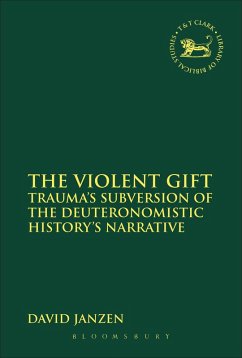The Violent Gift traces the narrative of the exilic author of the Deuteronomistic History, a narrative that provides an explanation for the trauma that the Judean community in Babylon suffered. As the book follows this explanation through the History, however, it also reads Dtr through the lens of trauma theory. Massive psychic trauma is not something that can be captured within narrative explanation, and trauma intrudes into the narrative's explanation of the exiles' trauma. Trauma challenges the claims upon which the narrative's explanation is based, thus subverting this attempt to make sense of the exile.
The author argues that we can trace a single, coherent narrative throughout the Deuteronomistic History that is an attempt to explain to its original readers why the exile occurred. The narrative offers two reasons for the exile, and these form the two main themes of Dtr's narrative: the people failed in their covenantal loyalty to God; and their leadership also failed to enforce this loyalty. These themes can be traced consistently through all of the component books of the History.
The author argues that we can trace a single, coherent narrative throughout the Deuteronomistic History that is an attempt to explain to its original readers why the exile occurred. The narrative offers two reasons for the exile, and these form the two main themes of Dtr's narrative: the people failed in their covenantal loyalty to God; and their leadership also failed to enforce this loyalty. These themes can be traced consistently through all of the component books of the History.


